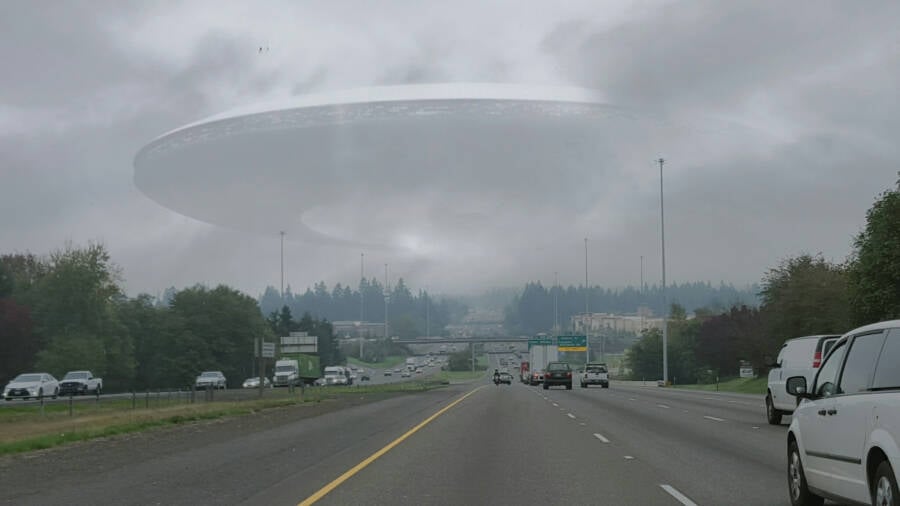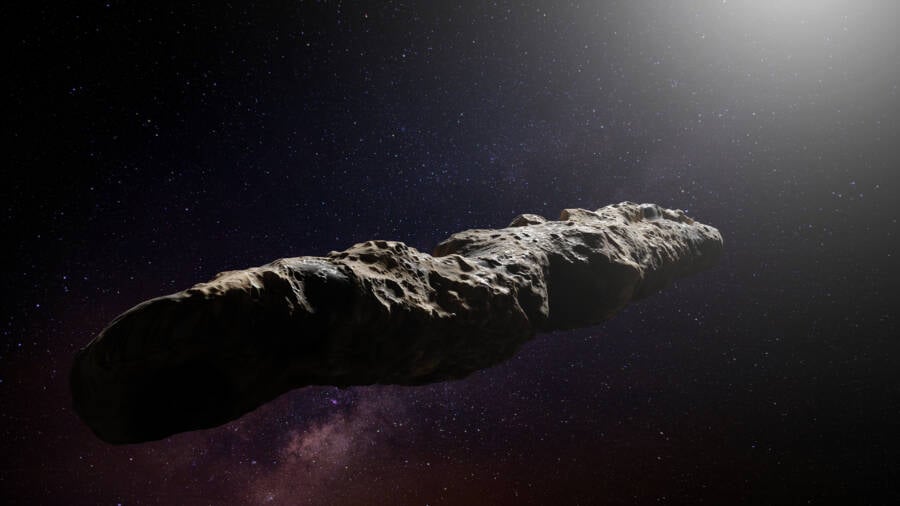The mysterious interstellar object ‘Oumuamua may be an alien spaceship sending out probes to other planets, the draft paper suggests.

Sherri Lynn Herrmann / EyeEm via Getty ImagesA draft paper by a Harvard scientist and the head of the Pentagon’s UFO office has dubbed the potential tiny probes released by alien spacecraft “dandelion seeds.”
A Harvard scientist and a Pentagon official just released a draft document speculating that aliens may be visiting our solar system and sending out tiny probes to explore planets.
The paper was drafted by Harvard University astronomer Avi Loeb and Sean M. Kirkpatrick, the director of the Pentagon’s All-domain Anomaly Resolution Office (AARO), which was established by the Department of Defense in July 2022 to study “objects of interest.”
In the paper, Physical Constraints on Unidentified Aerial Phenomena, the pair said it is possible that an extraterrestrial spaceship could be in the galactic vicinity of Earth, sending out “dandelion seeds” to explore nearby planets. These seeds, they said, would be similar to spacecraft sent out by NASA to explore unknown areas of space.
Loeb has previously spoken on the potential of extraterrestrial life a number of times. In September 2022, the astronomer suggested that a meteor at the bottom of the South Pacific could in fact be hiding alien technology. He is also widely known for his research into ‘Oumuamua.
‘Oumuamua was first detected in 2017 by astronomers who initially believed it to be a comet. Further study, however, has called the comet theory into question. ‘Oumuamua is a cigar-shaped cosmic object from outside our solar system, but its shape is atypical for a comet, and it lacks a coma, the cloud of gases that envelops comets.
Furthermore, ‘Oumuamua was accelerating away from the Sun, leading Loeb to speculate that it was perhaps an alien spaceship.
Coincidentally, just months before ‘Oumuamua neared Earth, a small meteor called IM2 that measured around three feet wide smashed into the planet.
IM2 wasn’t related to ‘Oumuamua, but the coincidence inspired Loeb “to consider the possibility that an artificial interstellar object could potentially be a parent craft that releases many small probes during its close passage to Earth, an operational construct not too dissimilar from NASA missions,” he told Live Science.
“These ‘dandelion seeds’… could be separated from the parent craft by the tidal gravitational force of the Sun or by a maneuvering capability,” he added.

iStock/Getty Images‘Oumuamua, the cosmic visitor that could be an alien spaceship.
In the draft document, Loeb and Kirkpatrick suggested that these dandelion seeds would be able to reach Earth for exploration without detection, as they would likely be too small to reflect the sunlight necessary for telescopes to see them.
“With proper design, these tiny probes would reach the Earth or other solar system planets for exploration, as the parent craft passes by within a fraction of the Earth-Sun separation — just like ‘Oumuamua did,” they wrote. “Astronomers would not be able to notice the spray of mini probes because they do not reflect enough sunlight for existing survey telescopes to notice them.”
They also suggested that if these dandelion seeds were properly equipped with “a large surface-to-mass ratio of a parachute,” they could slow down enough when entering the Earth’s atmosphere to avoid burning up. Then, they could simply explore freely after they landed.
In the draft paper, the scientists also put forth the theory that aliens would likely want to explore rocky planets with an atmosphere — meaning Venus, Earth, and Mars. Earth, however, would be particularly enticing, given the large amount of water on our planet.
The alien civilization that created these probes, they wrote, would not need to be on the mothership. In fact, it’s likely they wouldn’t be able to communicate with the probes. Loeb and Kirkpatrick also raised the point that this civilization may not even exist anymore, given that most stars in the solar system formed billions of years before the Sun.
In that sense, a habitable planet with intelligent life may very well have been sending out probes hundreds of thousands of years before Earth even formed. Loeb likened this posthumous search to “checking our mailbox for any packages that may have accumulated over time there, even if the senders are not alive anymore.”
Of course, this is all theoretical, and Loeb’s views have long been controversial in the astronomy community. In fact, as The Wall Street Journal reported, recent research suggests that ‘Oumuamua might have entirely natural origins.
And the paper authored by Loeb and Kirkpatrick is still under review.
But that doesn’t mean their theories should be ruled out entirely, either. This all plays into what Loeb has called the “‘Oumuamua Wager,” a play on the philosophical argument of Pascal’s Wager.
Established in the 17th century, Pascal’s Wager suggested that a rational person should live their life as if God existed, for if God does exist, then they would have lived a good life and been granted a place in Heaven. And if God does not exist, then they would have lost nothing and still lived a good life.
Loeb’s ‘Oumuamua Wager, then, suggests that it might be worth believing that ‘Oumuamua is an alien spaceship — if only to open our minds to the possibility of life beyond Earth.
After learning about the report that suggests an alien mothership is observing Earth, read about the “Super-Earth” that may be our best bet for finding intelligent life on another planet. Or, see these three places and creatures on Earth that may hint at alien life.





